
You are logged in as
Logout
You are logged in as
LogoutThis website uses cookies to distinguish you from other users. This helps us to provide you with a good user experience and also allows us to improve our website. More information

 The Junior Department holds an assembly most weeks on a Friday.
The Junior Department holds an assembly most weeks on a Friday.
Years 4–8 have an assembly most Monday mornings at 8.35am.
The Preparatory School has three major assemblies each year – towards the end of Terms 1, 3 and 4. At these assemblies we acknowledge major academic, sporting, cultural and service achievements.
 Children are able to work towards several badges and awards each year – the major ones being Sports and Cultural Badges.
Children are able to work towards several badges and awards each year – the major ones being Sports and Cultural Badges.
 Each year, students in Years 4–8 attend a camp.
Each year, students in Years 4–8 attend a camp.
Year 4: Woodend Christian Camp in Term 3
Year 5: Living Springs in Term 4
Year 6: Wainui in Term 4
Year 7: Kura Tawhiti Castle Hill in Term 4
Year 8: Kura Tawhiti Castle Hill in Term 2
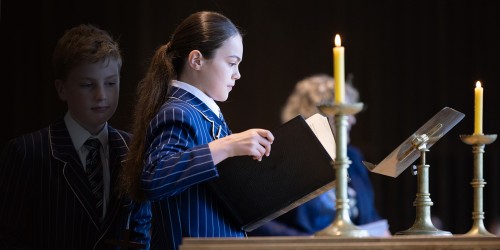 All students attend a weekly daytime chapel service. For the Preparatory School this service is at 8.45am on Tuesdays. The services are led by one of our chaplains.
All students attend a weekly daytime chapel service. For the Preparatory School this service is at 8.45am on Tuesdays. The services are led by one of our chaplains.
We also hold a Sunday evening service towards the end of Terms 1, 2 and 4. Students also participate in weekly Religious Education lessons in the classroom.
There is also one a Year 8 Communion Chapel during the year, held in Term 3.
Information is sent out by classroom teachers and where possible, included in the term planner. Email notification of each trip, including method of transport, will be sent home prior to the outing. If you do not wish for your child to attend a specific outing, please notify the classroom teacher as soon as possible. Click here to see the list of our teachers' contact details.
All Level 3 and 4 trips will require specific consent. We use busses and coaches for outings in the Christchurch area and further afield. If just a small number of children are involved, we may use parent transport or school vans. The cost for outings will be disbursed to your child’s individual account after the activity.
Level 0: Trips within walking distance which are low risk (e.g. local tennis courts, Elmwood Park, etc.).
Level 1: Trips within Christchurch which require transport (e.g. visits to Museum, sporting fixtures etc.).
Level 2: Trips away from Christchurch.
Level 3: Trips involving overnight stay.
Level 4: Adventure activities (i.e. camps, skiing, and water activities).
Home Learning is limited to personal choice reading for students in Years 3–8. In Years 1–2, home learning will be the reinforcement of the classroom Structured Literacy programme.
We would like all children from Year 5 to know their times tables. The chart below shows the 36 tables that need to be known. Tables can be learnt by anyone irrespective of Mathematics ability and learning style. In just about all cases, tables can be learnt verbally and can be done at any time. When driving in the car is a good time.
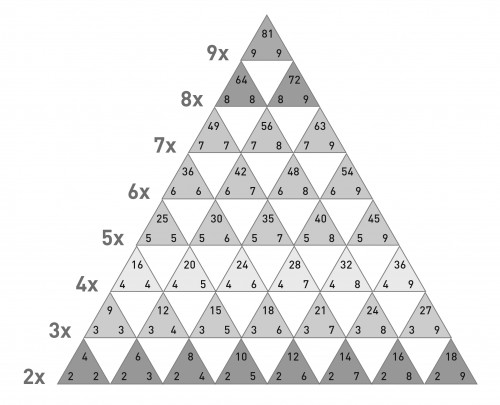
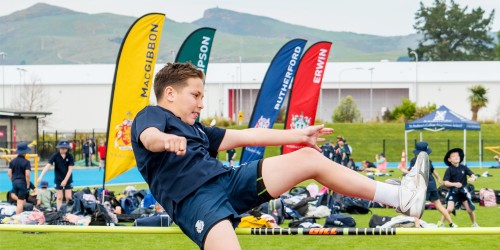 Students are allocated to one of four houses, and if there is a family connection we endeavour to place students in the same house. Please let the office know of any family connections.
Students are allocated to one of four houses, and if there is a family connection we endeavour to place students in the same house. Please let the office know of any family connections.
MACGIBBON – Yellow
RUTHERFORD – Blue
THOMPSON – Green
ERWIN – Red
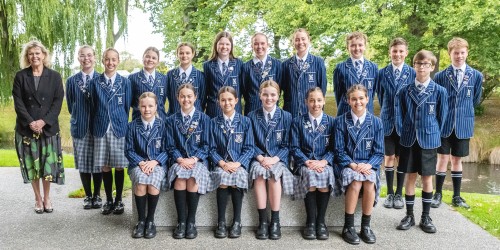 There are many opportunities for leadership and service throughout the Preparatory School, particularly for our senior students.
There are many opportunities for leadership and service throughout the Preparatory School, particularly for our senior students.
Leadership opportunities available are: sacristan, librarian, sports captain, house captain, road patrol warden, science monitor and other meaningful responsibilities.
 The Head of Learning Enrichment (HLE), Mrs Kelly McBride, is responsible for the identification of able students in the school and for the preparation of school statements, policies and procedures in this area. The HLE works with staff to ensure that class programmes meet the needs of the able learners in the school at all levels. Where necessary, Individual Education Plans (IEPs) will be established. These plans may require students to work in other rooms from time to time. Catering for gifted and talented students within the class environment is achieved with multi-levelled or student-centred learning.
The Head of Learning Enrichment (HLE), Mrs Kelly McBride, is responsible for the identification of able students in the school and for the preparation of school statements, policies and procedures in this area. The HLE works with staff to ensure that class programmes meet the needs of the able learners in the school at all levels. Where necessary, Individual Education Plans (IEPs) will be established. These plans may require students to work in other rooms from time to time. Catering for gifted and talented students within the class environment is achieved with multi-levelled or student-centred learning.
The following areas are offered in Learning Enrichment:
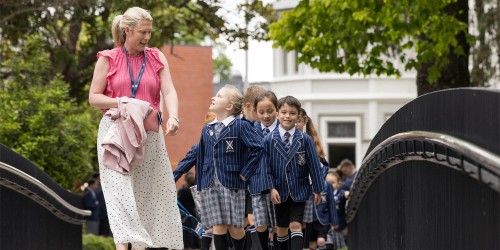 Where required, student learning is supported by the school’s learning support team. The programmes offered are considered crucial for building self-esteem and addressing delayed learning. We have a full-time reading specialist and several teacher aides, and offer support in subjects such as reading, mathematics, spelling and writing. This support is based on individual student needs and is priority assessed.
Where required, student learning is supported by the school’s learning support team. The programmes offered are considered crucial for building self-esteem and addressing delayed learning. We have a full-time reading specialist and several teacher aides, and offer support in subjects such as reading, mathematics, spelling and writing. This support is based on individual student needs and is priority assessed.
 Opening Hours
Opening Hours
Monday–Friday: 8.00am–4.00pm
(Closed at interval, but open at lunchtime from 1.00pm–1.30pm)
The Library is situated in the Library and Arts Centre and has a large collection of fiction and non-fiction resources. Eight desktop computers are also available for students to use as part of their learning.
Books are issued for three weeks and can be returned to the library desk or in the after hours slot outside the Library door. Click here to access to our library catalogue and our digital collections. This link can also be found is via under student resources. This access is available from home or school. Student librarians are selected from Year 8. Parents are encouraged to visit the Library with their child.
When Regulus to Angus bore
At King’s Mount, by the grey North Sea
St Andrew’s relics, and the lore of Truth,
to set the heathen free.
Loud sang the King then the praise of St Andrew,
Loud from the grey granite cliffs came reply,
Honour and fame to the name of St Andrew
Glory shall fold it that never shall die.
Through years of toil and bitter war
The sons of Angus toiled amain,
And still the Truth received of yore
Made woe and darkness light again.
Great grew the land of the Holy St Andrew,
Far flowed the light from the torch by the sea.
Old world and new told the fame of St Andrew,
High flew his Cross o’er the brave and the free.
And we who bear St Andrew’s name
Beneath a cross he never knew,
Must strive for truth and guard his fame
With heart as high and soul as true.
Strong as the grey granite cliffs of St Andrew’s
Wise as the good saint that lived long ago,
So shall the years gather fame to St Andrew’s
And we shall praise her while ages shall flow.
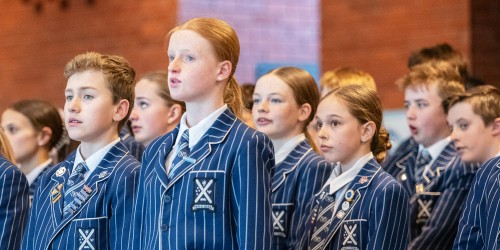 To ensure StAC-Up is a living part of the Preparatory School, it is important all students, staff and parents know and understand the expectations the school has for being part of and contributing to our community.
To ensure StAC-Up is a living part of the Preparatory School, it is important all students, staff and parents know and understand the expectations the school has for being part of and contributing to our community.
We use the following StAC-Up Expectations to ensure that our school is a productive, happy and safe place for everyone.
Be Safe – inside, outside and online.
Be Ready – to learn in all situations.
Be Respectful – towards others and yourself.
St Andrew’s College Preparatory School is committed to a positive, friendly and encouraging learning environment. Our expectation is that all children will be happy at school and that they will interact in an appropriate and acceptable manner with their peers.
We believe that all children have the right to learn within a safe and caring environment, and in an environment that is conducive to all aspects of their education.
In situations of ongoing physical, verbal or faceless (via text, instant messaging or e-mail) bullying and on-going disrespectful or unsafe behaviours.
In an environment that encourages positive relationships, we expect:
In an environment that encourages positive relationships, we expect:
At the Preparatory School we would undoubtedly prefer that students did not have access to social media – in particular any apps that have an age rating of 13+. If your child does use any form of social media at home, it is important to check in with them regularly and take a close interest in their online activities.
Below is a summarised version of our Student Social Media Guidelines. Please click here to read the guidelines in full.
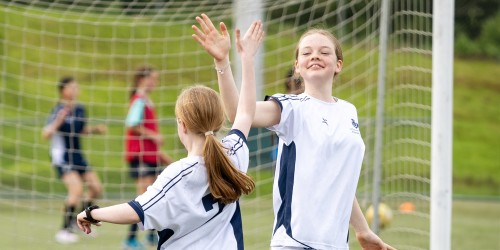 Counselling facilities are available to parents with student concerns. For most matters, parents will initially consult with their child’s classroom teacher, the Principal of Preparatory School or syndicate leaders. For matters of assessment, referral or guidance with more personal matters, Mrs Vicki Pettit can be contacted through the Preparatory School office. Mrs Vicki Pettit co-ordinates referrals to the Counsellor.
Counselling facilities are available to parents with student concerns. For most matters, parents will initially consult with their child’s classroom teacher, the Principal of Preparatory School or syndicate leaders. For matters of assessment, referral or guidance with more personal matters, Mrs Vicki Pettit can be contacted through the Preparatory School office. Mrs Vicki Pettit co-ordinates referrals to the Counsellor.
